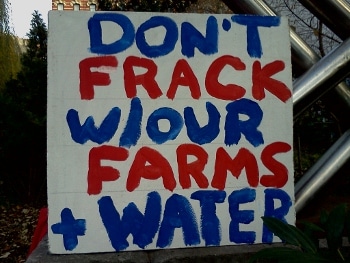Documents obtained by the Environmental Working Group (EWG) show that bureaucrats within the New York Department of Environmental Conservation (NY DEC) granted the oil and gas industry premature access to highly controversial draft regulations for shale gas fracking in the state. New York placed a moratorium on hydraulic fracturing for gas in order to evaluate the science on the risks posed to drinking water, air quality and the health of New York’s citizens and the environment.
The documents, obtained by EWG through New York’s Freedom of Information Law, show that the fracking industry received an unfair advantage thanks to DEC officials who provided detailed summaries of their proposed rules exclusively to oil and gas industry representatives. This allowed industry a six-week head start to lobby state officials to weaken the proposed standards before the public was granted access to the plan.
Of particular concern, a lobbyist for scandal-ridden gas giant Chesapeake Energy used the exclusive access to the draft Supplemental Generic Environmental Impact Statement (SGEIS) to attempt to weaken the proposed rules restricting discharges of radioactive wastewater.
Thomas West, a prominent oil and gas industry lobbyist representing Chesapeake and other industry clients, made “one last pitch” – in an email to DEC Deputy Commissioner and General Counsel Steven Russo – to “reduce or eliminate radionuclide testing” of fluids that could migrate from drilling sites during storms, according to the documents.
NY DEC has previously found concentrations of cancer-causing radioactive pollution at shale gas drilling sites that exceeded safe drinking water standards by hundreds of times or more, according to EWG‘s report “Inside Track: Cuomo Team Gives Drillers Jump Start to Influence Fracking Rules.”
“This is like giving the drilling industry three laps around the track while everyone else was left waiting on the starting block,” said Thomas Cluderay, EWG assistant general counsel. “The public needs to know whether New York regulators compromised the integrity of the state’s drilling plan months ago, despite promises of keeping the process fair and transparent.”
This latest tale of special interests receiving special treatment from the agencies that are supposed to referee their activities was first revealed today in the Albany Times Union.
New York DEC attempted to justify its actions by claiming that “selective advance sharing by DEC was neither required nor prohibited” by state statutes, according to the Times Union article.
New York Governor Andrew Cuomo is expected to make a decision “shortly” on the fate of fracking in New York, a proposition that has drawn fierce grassroots resistance and strained relations in communities across the state. The DEC is reviewing nearly 70,000 public comments submitted after its plan was published last September.
This will be one of the highest profile decisions ever made on fracking, since it could put at risk the drinking water and public health of New York City’s eight million residents and millions more in affected areas of the state.
If adopted, the NY DEC‘s proposed regulations could allow 50,000 gas wells in New York’s portion of the Marcellus Shale. EWG and the New York-based Physicians, Scientists and Engineers for Healthy Energy released a report earlier this summer documenting the serious flaws in New York’s proposed drilling plan.
This new evidence demonstrates that the NY DEC has compromised the integrity of the environmental review process by working behind the scenes to give advanced access to industry officials on rules that should be seen by all stakeholders for an equal amount of time during a standard public comment period.
It certainly seems unfair – and potentially improper – for the NY DEC to grant special access to polluters ahead of public access to the proposed rules.
The Chesapeake representative, Thomas West, appears to enjoy a cozy relationship with regulators charged with protecting New Yorkers’ environment and public health. In his biography on his law firm’s website, Thomas West boasts about being “at the forefront of the 2008 amendments to New York law to accommodate the development of the shale resources in New York State.”
Noting his heavy involvement in the New York fracking review process, West continues,
“Since the passage of that law, he has been actively involved with the environmental review process being conducted by the New York State Department of Environmental Conservation (“DEC”) to prepare a Supplemental Generic Environmental Impact Statement (“SGEIS”) relative to high-volume hydraulic fracturing. He has been working closely with industry on their comments to the DEC relative to the SGEIS and recently represented an industry working group in responding to technical comments from the DEC. He is also currently counseling several clients concerning the steps that must be taken to defend against the highly anticipated litigation that will be brought challenging the SGEIS…” [emphasis added]
West also mentions that he “currently represents one major operator before the New York State Legislature and the Governor’s office relative to oil and gas issues.”
Presumably he’s referring to his client Chesapeake Energy, the nation’s second largest natural gas company behind ExxonMobil. Exxon CEO Rex Tillerson recently admitted that his company is currently making ”no money” on U.S. natural gas due to the stale economics of the industry. Tillerson told the Wall Street Journal that ExxonMobil’s shale gas bet is a bust, at least to date.
“We are losing our shirts,” Tillerson told the Wall Street Journal.
All eyes are on NY Governor Cuomo now, who must reign in the DEC‘s inappropriate dealings with the fracking industry and rely on the best science available to protect New Yorkers from the dangers of fracking seen elsewhere in the U.S. and around the world.
To view the internal documents and learn more about the NY DEC‘s contact with industry on this controversial subject, head over to EWG‘s report: Inside Track: Cuomo Team Gives Drillers Jump Start to Influence Fracking Rules.
Full disclosure, I worked at EWG from 2000-2004.
Subscribe to our newsletter
Stay up to date with DeSmog news and alerts







